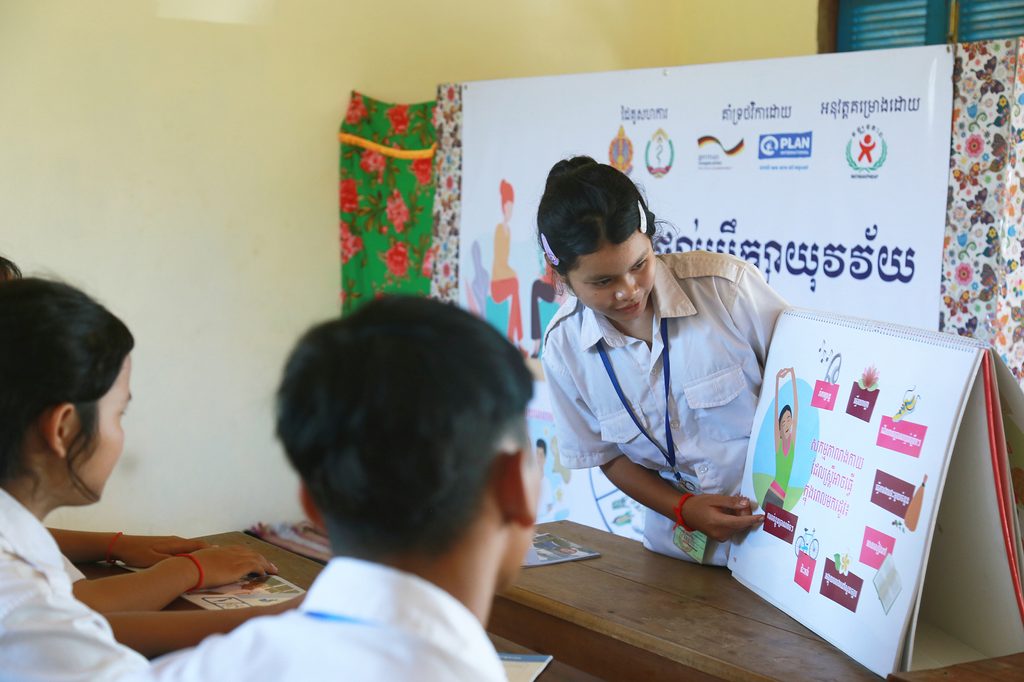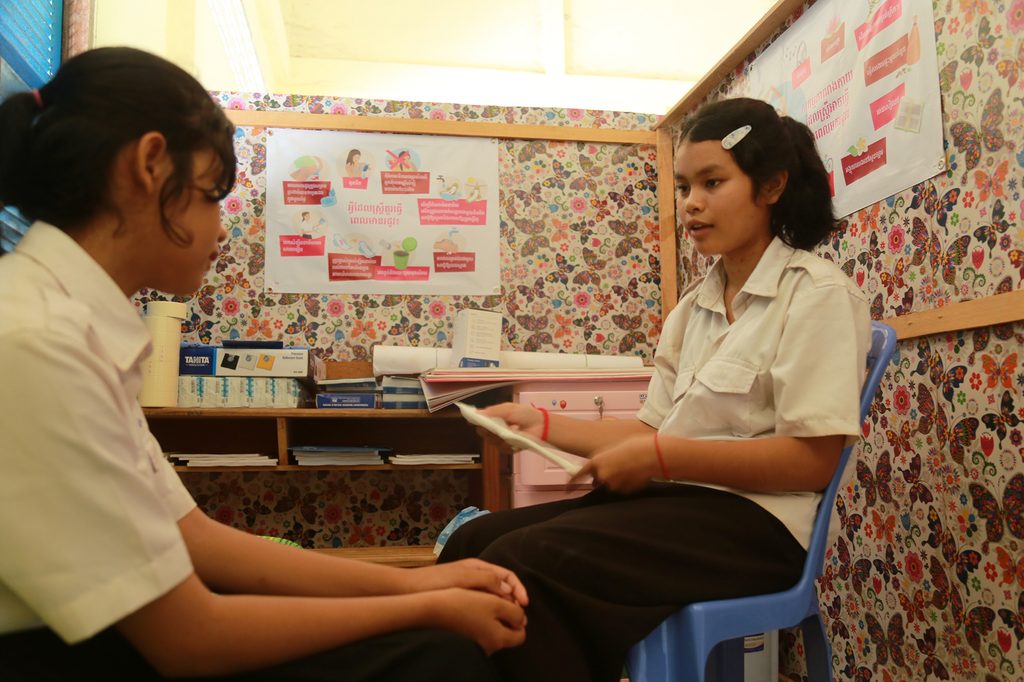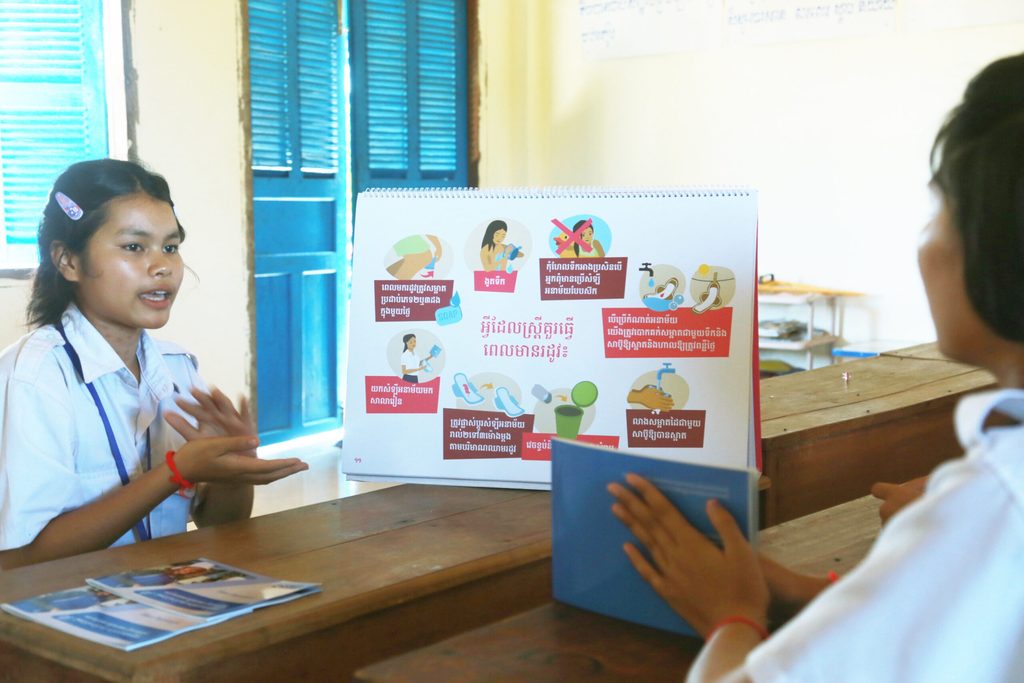Sreyneth, 14, raises awareness about sexual reproductive health and rights among her peers and changes the old practices in her ethnic minority community.
Holding a sanitary pad in her hand, 14-year-old Sreyneth demonstrated to her classmates how to use it during their menstrual period. When asked why she was doing this, she smiled and said, “I want all students to know about sexual reproductive health and rights.”

Lack of SRHR knowledge in Sreyneth’s community
Sreyneth, a girl from the Prov ethnic minority living in Taveng District, Ratanak Kiri Province, is a peer educator on sexual reproductive health and rights (SRHR) at her school. She explained that in her community, especially among ethnic minorities like herself, there was little knowledge about SRHR. They followed practices passed down from older generations.
“Before, when we had our period, we always stayed at home and didn’t go out because our norms said that if we stayed at another house, we would bring bad luck,” explained Sreyneth. “Also, we didn’t go to school because we were ashamed of our male classmates and had difficulties changing our pads.”
As the second daughter of a farming family, Sreyneth noted that many young people in her community drop out of school due to financial challenges, some marry at 14 or 15 without understanding the consequences. Awareness about SRHR is not widespread in these remote areas.

“I was selected to conduct peer-to-peer education because I can speak both Khmer and Prov [the ethnic minority language],” Sreyneth recalled. “At first, I had mixed feelings—I was nervous and happy. I told the staff I wanted to do it but didn’t know how. They assured me that they would provide training.”
Sreyneth received training and coaching from schoolteachers and project staff on SRHR and counselling skills. After the training, she shared her knowledge with classmates during school breaks, speaking for about 10 minutes each session.
“I want all students to know about sexual reproductive health and rights.”
Sreyneth
When asked about her challenges, Sreyneth quickly replied that, in the beginning, she was disappointed as her classmates didn’t join the sessions. “But I didn’t want to give up because I wanted them to know about SRHR. Another challenge was that I was a shy girl and didn’t dare to talk about sex and reproduction because I was taught that it wasn’t proper for a girl to talk about that,” Sreyneth continued. “My teachers always encouraged and motivated me by saying that I can do it. As a result, I gained confidence and dared to talk to my classmates about these topics.”
Sreyneth hosts SRHR education sessions
For the new school academic year, Sreyneth has conducted 5 sessions on menstrual hygiene management, youth body changes, and the consequences of early marriage. She gets the support from her parents and always receives good advice from them. Consequently, most students no longer miss school during their periods, and male students do not tease female students about it.
“I feel happy now because I can help my friends continue their studies,” Sreyneth said with a smile. “I also want to improve my knowledge and skills so I can do my job better and my friends will understand SRHR clearly.”
Despite her busy schedule with project activities, Sreyneth never forgets to help her parents with house chores and farming. She helps with Sunday farming and house chores in the mornings and evenings before and after school. Once a girls’ football tournament runner-up, Sreyneth plays football in the evenings after school. “I want my body to be strong to be a soldier and protect our country when I grow up.”

Plan International Cambodia’s intervention
With funding support from The Federal Ministry of Economic Cooperation and Development, Plan International Cambodia and its partners, Watanapheap are implementing a three-year project, “Time to Act,” in Ratanak Kiri Province, where Sreyneth lives. The project aims to reduce child, early and forced marriages and unions and child pregnancy in disadvantaged and remote areas of North-Eastern Cambodia. One of the project activities is raising awareness of SRHR among lower secondary school students, and Sreyneth was selected as peer education and she plays the role to conduct peer-to-peer education.
Sreyneth is a sponsored child with Plan International.


